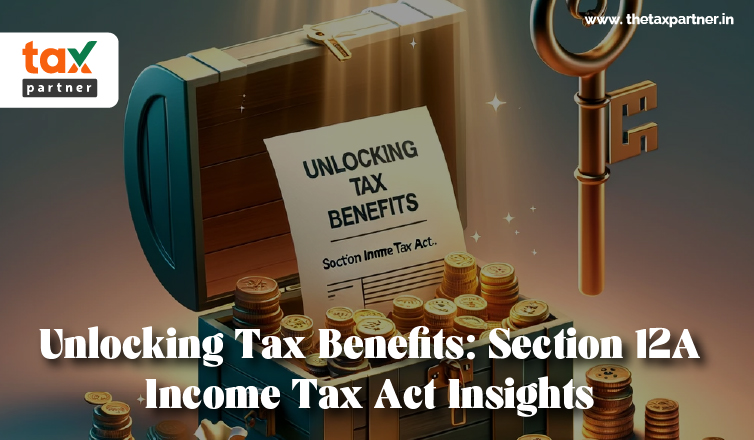Section 12A & 12AB Income Tax Act Insights
Unlocking Tax Benefits: Section 12A Income Tax Act Insights
Author- Tanvi Thapliyal
There was a significant transformation in the landscape of non-profit organisations in India due to the Finance Act, 2020, which introduced pivotal amendments to Section 12A of the Income Tax Act. The amendments, especially the addition of Section 12AB, have significantly impacted the registration process for charitable and religious entities, emphasising on the importance of compliance and transparency in the sector. It is crucial for non-profit organisations to grasp the intricacies of Section 12A and the impact of the recent amendments in order to successfully operate within the regulatory framework. This article explores through the intricacies of Section 12A, highlighting its importance, consequences, and the influence of tax laws on charitable donations and social welfare in India.
Purpose behind introduction of section 12 (A)
Section 12A of the Income Tax Act, 1961, aims to acknowledge and offer tax benefits to non-profit organisations involved in charitable or religious activities. Section 12A motivates organisations to engage in charitable activities by providing tax exemptions on the income generated from such endeavours, allowing them to contribute to society's welfare without facing tax obligations. This provision is designed to support charitable work, social welfare, and religious activities by eliminating financial obstacles and allowing these organisations to dedicate more resources to their important causes. Furthermore, Section 12A promotes transparency and accountability in the non-profit sector through registration requirements and compliance standards. This helps ensure that tax benefits are granted to organisations that truly benefit the public. In general, Section 12A aims to support the expansion and efficiency of non-profit organisations while furthering the overall objectives of social development and community welfare in India.
Section 12A: Key Features
-
Section 12A offers tax exemption to non-profit organisations for income generated from their charitable or religious activities. It enables these organisations to use their funds more efficiently for their social welfare goals without the hassle of taxation.
-
Non-profit organisations need to apply for registration under Section 12A with the Income Tax Department in order to qualify for tax exemptions. Registering confirms the organization's eligibility and guarantees compliance with regulatory requirements.
-
When applying for registration under Section 12A, you need to submit Form 10A to the Commissioner of Income Tax (Exemptions) within the specified time limits. The application process involves providing the required documents and information regarding the organisation's activities and goals.
-
Organisations registered under Section 12A need to ensure that their activities align with their charitable or religious purposes. It is important to adhere to the requirements outlined in the Act, such as keeping accurate records and other necessary documents.
-
Donors can benefit from making donations to organisations registered under Section 12A as they are eligible for deduction under Section 80G of the Income Tax Act. Encouraging people and businesses to donate to charitable causes helps to strengthen the efforts of non-profit organisations.
Application Process and Documents Needed for Registration under Section 12AB
Registration Process
Step 1: Please log in to the Income Tax India E-Filing Portal with your login credentials and password.
Step 2: Go to "Income Tax Forms" under the E-File tab and choose Form 10A/10AB, depending on your situation
Step 3: Choose the "Prepare and Submit online" option to enter necessary information in the form
Step 4: Please attach the necessary document with Form 10A/10AB.
Step 5: Complete the form by adding digital signatures or using EVC
Step 6: Upon receiving the application in Form No. 10A or 10AB, the PCIT or CIT will proceed to process the application within the specified time frame. There is no text to rewrite.
If the applicant is already registered under section 12AA or has submitted Form No. 10A for provisional registration, the registration will be granted in writing using Form No. 10AC. Upon successful registration, you will receive a 16-digit alphanumeric Unique Registration Number (URN).
When Form No. 10AB is submitted, the decision will be communicated through Form No. 10AD.
Documents Required
-
If the trust or institution is created, or established under an instrument, a self-certified copy of such instrument creating or establishing the trust or institution
-
If the trust or institution is formed or set up without a formal document, a self-certified copy of the document proving its creation or establishment is required.
-
A copy of the registration with the appropriate authority is required.
-
Copy of registration under FCRA required if the applicant is registered under such Act.
-
Copy of the current registration order under section 12A or 12AA or 12AB, as applicable
-
A self-certified copy of the order of rejection of the application for the grant of registration under section 12A or 12AA or 12AB, as applicable, if any;
-
If there are existing entities, please provide copies of annual accounts for the period not exceeding 3 years immediately preceding the year in which the application is made.
-
If the entity's income includes profits and gains of business according to the specified section, copies of annual accounts and audit report for the three years before the application year must be provided.
-
A copy of the documents proving adoption or modification of the objects is required.
-
Observations regarding the operations of the applicant trust or institution
-
If you have registered on the DARPAN Portal, please provide the details of your registration.
Requirements organisations need to fulfil to retain their Section 12A status
-
It is important for organisations to make sure that their activities align with charitable or religious purposes, as outlined in the Income Tax Act. Not aligning to the specified goals might put their Section 12A status at risk.
-
It is essential for non-profit organisations to keep their books of accounts accurate and current, which should include details of income, expenses, assets, and debts. Following correct accounting procedures is crucial for upholding transparency and accountability, both of which are necessary for retaining Section 12A status.
-
Organisations registered under Section 12A must submit annual returns to the Income Tax Department by the specified deadlines. The returns offer a comprehensive overview of the organization's activities, finances, and adherence to regulatory standards.
-
Income from non-profit organisations must be used exclusively for charitable or religious purposes. If funds are diverted for non-charitable purposes, it may result in the cancellation of Section 12A status.
-
Organisations need to inform the Income Tax Department about any modifications in their operations, legal structure, office bearers, or other important information. If not done, your Section 12A registration may be suspended or cancelled.
-
It is important for non-profit organisations to follow all applicable laws, regulations, and guidelines that govern their operations. Adhering to regulations such as tax deduction at source (TDS), foreign contributions, and other relevant rules is essential.
-
It is important for organisations to keep accurate records and documents regarding their activities, finances, and compliance efforts. These documents provide proof of the organization's qualification for Section 12A status and could be reviewed by tax authorities.
What is section 80G
Donations to specified funds, charitable institutions, and relief funds qualify for deduction under Section 80G. These involve contributions to educational institutions, hospitals, trusts, and specific government programmes.The deduction percentage varies based on the recipient organisation and the type of donation for Section 80G. Donations to specific funds or institutions might be eligible for a deduction of up to 100% of the donated amount, whereas other donations could qualify for a deduction of 50% or 75%.There are specific limits and conditions outlined in Section 80G that need to be met in order to qualify for tax deductions. Donations in cash over Rs. 2,000 are not eligible for deduction. Donors need to get receipts or certificates from the recipient organisation as proof of donation.It's important for donors to confirm that the recipient organisation is registered under Section 80G and can provide donation receipts for tax purposes. The Income Tax Department keeps a record of authorised organisations that qualify for tax deductions under Section 80G.
Deductions under Section 80G can decrease the donor's taxable income, ultimately reducing their total tax obligation. It motivates people and companies to donate to charitable causes and back the efforts of non-profit organisations.
Recent Changes & Amendments to Section 12A
The Finance Act, 2020 brought in important changes to the rules concerning the registration of charitable or religious organisations under Section 12A of the Income Tax Act, 1961. One significant change involved the introduction of Section 12AB, which replaced the previous Section 12A and updated the registration procedure for non-profit organisations.
Here's a summary of the recent changes and how they affect non-profit organisations.
Section 12AB replaced the registration process stated in previous Section 12A and brought in a new registration process for charitable or religious organisations looking for tax exemptions under the Income Tax Act.
Organisations must apply for registration and re-registration under Section 12AB. The above section came into effect from 1st June 2020 and the trusts or institutions were required to apply for registration and approval under section 12AB.
Re-registration Requirement:
Organisations already registered under Section 12A had to apply for re-registration under Section 12AB within 3 months from 1st June 2020, i.e., by 31st August 2020.
Reviewing the organization's activities, compliance history, and financial statements is part of the re-registration process under Section 12AB to confirm ongoing eligibility for tax exemptions.
Effects on Non-profit Organisations:
Section 12AB has led to procedural adjustments in the registration process for non-profit organisations, mandating them to go through a re-registration process within the given timeframe.
Non-profit organisations needed to make sure they were following the new requirements under Section 12AB, such as submitting applications and documentation on time, and having their activities and finances reviewed.
The shift from Section 12A to Section 12AB was intended to simplify the registration process, increase transparency, and ensure that tax exemptions are given only to legitimate organisations that meet the specified criteria.
Even with the procedural changes introduced by Section 12AB, non-profit organisations must still adhere to the conditions and obligations outlined in the Income Tax Act. This includes maintaining accurate records, submitting yearly returns, and using funds for charitable or religious causes.
Benefits Of Section 12A
-
It is crucial for non-profit organisations involved in charitable or religious activities to comply with Section 12A of the Income Tax Act, 1961. Here's the reason:
-
Non-profit organisations can access tax benefits through Section 12AB registration, which allows them to qualify for tax exemptions on income generated from their charitable or religious activities. Meeting the registration requirements guarantees that organisations can access tax benefits, allowing them to dedicate more resources to their social welfare goals without the weight of taxation.
-
compliance with Section 12A indicates an organization's dedication to transparency, accountability, and good governance, which enhances credibility and trust. This indicates that the organisation functions in accordance with the legal framework established by the Income Tax Department and complies with regulatory requirements. It boosts the organization's credibility and trust among donors, supporters, beneficiaries, and other stakeholders.
-
Section 12AB registration offers legal acknowledgment to non-profit organisations as authentic charitable or religious entities. Ensuring compliance with the registration process aligns the organization's objectives and activities with the criteria established by the Income Tax Department for tax exemption purposes. This validation enhances the organization's reputation and credibility in the eyes of the law and society.
-
Following Section 12A makes it easier for non-profit organisations to receive donations and funding. People are more likely to donate to organisations registered under Section 12A because it assures them that their donations will be used for genuine charitable causes. Accessing funding helps non-profit organisations sustain and grow while achieving their mission and goals.
Conclusion
It is crucial for non-profit organisations in India to adhere to Section 12A of the Income Tax Act to maintain credibility and sustainability. Following Section 12A shows transparency, accountability, and eligibility for tax benefits, crucial for securing funding and achieving their charitable goals along with the introduction Section 12AB has enhanced the registration process to make it more efficient and clearer.
TaxPartner offers personalised assistance to non-profit organisations, helping them with registration, compliance, and enhancing their effectiveness. TaxPartner helps organisations confidently explore regulations, focus on their mission, and strengthen their positive influence on society.
FAQs
What is Section 12A of the Income Tax Act?
Section 12A of the Income Tax Act, 1961, pertains to the registration and tax benefits available to charitable and religious trusts or institutions. It provides exemptions on income earned by such entities, subject to certain conditions.
Who is eligible to apply for registration under Section 12A?
Charitable and religious trusts or institutions, including NGOs, educational institutions, hospitals, and religious bodies, can apply for registration under Section 12A to avail of tax benefits on their income.
What are the benefits of registration under Section 12A?
Registered entities under Section 12A enjoy several benefits, including:
Exemption from paying income tax on income applied for charitable or religious purposes.
Donations made to such registered entities are eligible for deduction under Section 80G of the Income Tax Act.
What is the procedure for obtaining registration under Section 12A?
To obtain registration under Section 12A, the trust or institution must apply to the Commissioner of Income Tax (Exemptions) using Form 10A. The application should be accompanied by various documents, including the trust deed, details of trustees, and audited financial statements.
Is there any time limit for applying for registration under Section 12A?
Yes, there is a time limit for applying for registration under Section 12A. The application must be made within one year from the date of creation of the trust or institution. However, the Commissioner has the discretion to condone the delay in certain cases.
Can a trust or institution claim tax exemption if it fails to obtain registration under Section 12A?
No, trusts or institutions must obtain registration under Section 12A to avail tax exemptions on their income. Failure to obtain registration will result in the income being subject to taxation as per regular income tax rates.
Can registered entities under Section 12A carry forward losses?
Yes, registered entities under Section 12A can carry forward losses incurred in previous years, subject to certain conditions and limitations specified under the Income Tax Act.
Are there any compliance requirements for registered entities under Section 12A?
Yes, registered entities are required to comply with various reporting and compliance requirements, including maintaining proper books of accounts, filing annual returns, and adhering to the conditions specified in their trust deeds.
Can a trust or institution surrender its registration under Section 12A?
Yes, a trust or institution can surrender its registration under Section 12A by submitting an application to the Commissioner of Income Tax (Exemptions). Upon approval, the entity will no longer be eligible for tax exemptions under this section.
How can TaxPartner assist trusts or institutions in unlocking tax benefits under Section 12A?
TaxPartner provides comprehensive assistance to trusts and institutions seeking registration under Section 12A. Our services include guiding clients through the registration process, ensuring compliance with regulatory requirements, and optimizing tax planning strategies to maximize benefits under the Income Tax Act.



